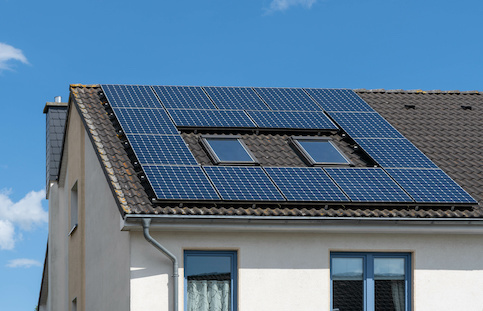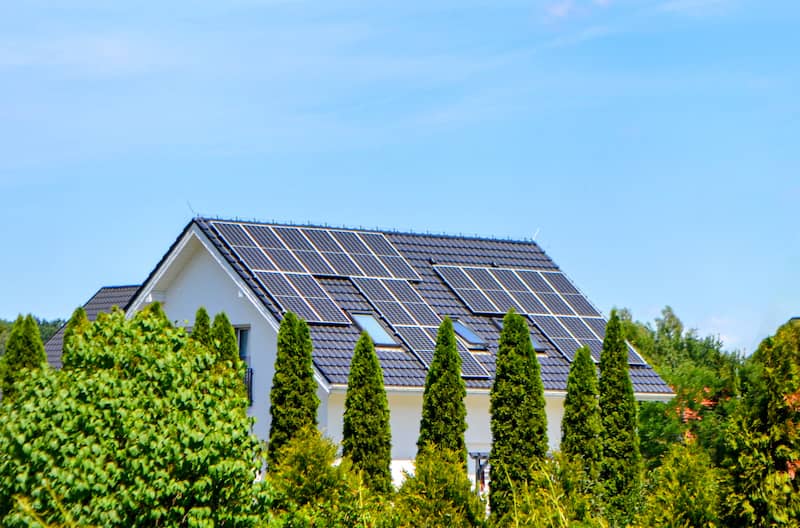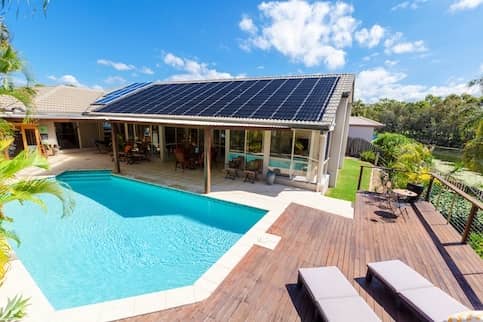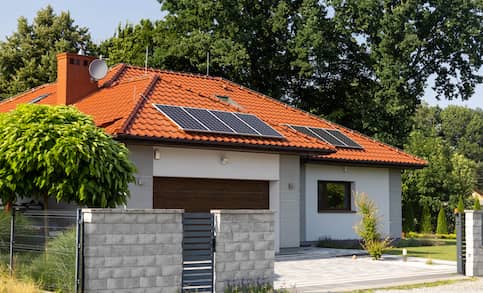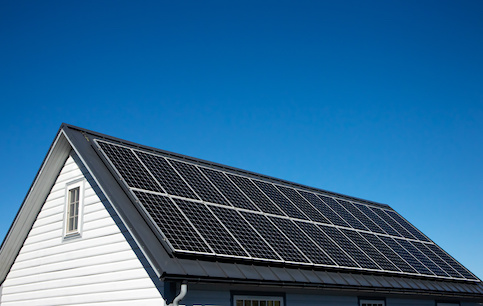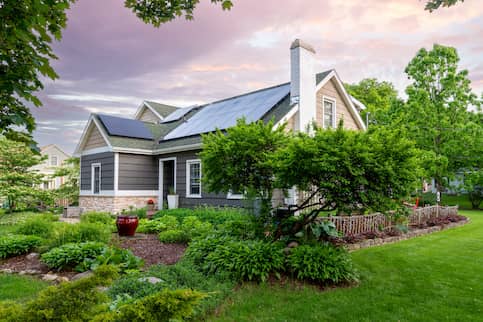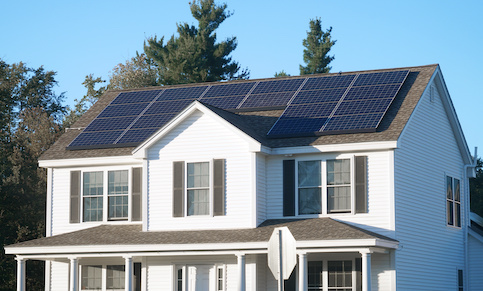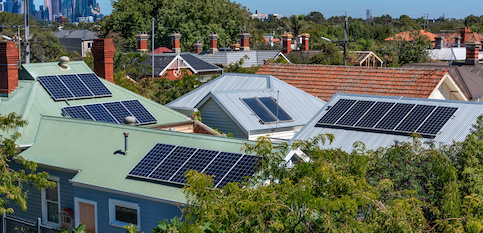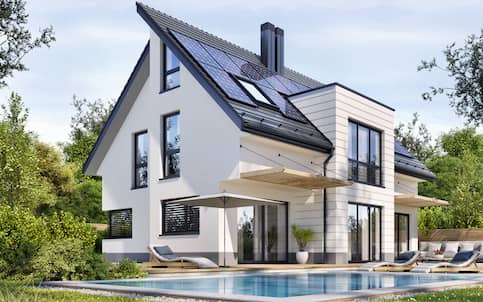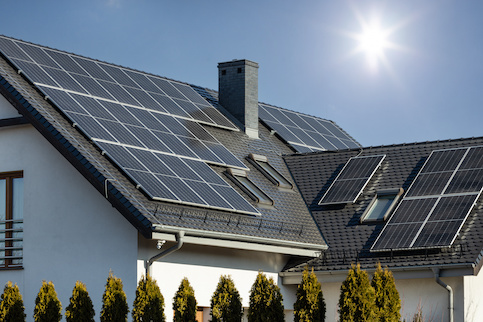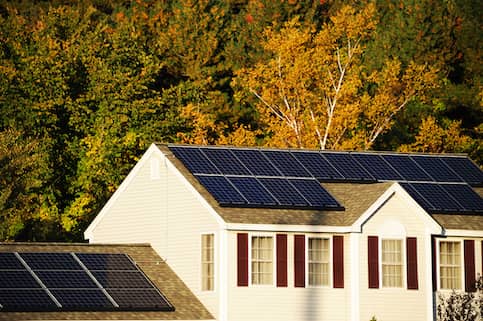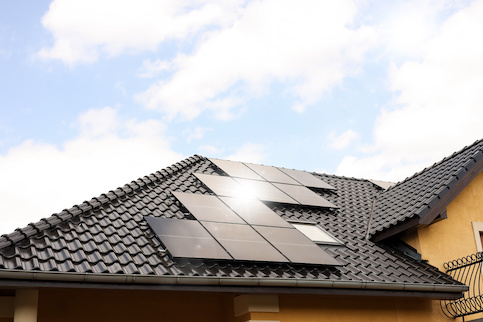Solar panels offer homeowners a clean and renewable energy source, potential energy bill savings and possible tax benefits. To get the most out of going solar, it pays to find the type of panels that will last and create the most energy for you.
Key Takeaways:
- There are three main types of residential solar panels: monocrystalline, polycrystalline, and thin film.
- Solar panel efficiency depends on many factors, including weather, the location of your house and the panels themselves.
- Solar panels can be leased or financed through a loan or home equity.
Types Of Home Solar Panels
Homeowners can choose from three common types of solar panels. Beyond efficiency, it’s important to consider other factors like cost, durability and your own unique house when making a choice.
Monocrystalline Solar Panels
Typically, monocrystalline panels – built with monocrystalline solar cells – are considered the most efficient option for residential properties. They usually have an efficiency rating of 20% to 22%, though some experimental models are rated closer to 50%. Since these panels have higher efficiency ratings, they’re more expensive.
Monocrystalline panels can last up to 25 years and require less space than other types. Snow can damage them, which is a problem if you live in a cooler climate.
Polycrystalline Solar Panels
Polycrystalline solar panels are built of multiple silicon crystals melded together, with a solar efficiency rating between 13% and 16%.
Since the panels are less efficient, they take up more space and are often more affordable. The manufacturing of polycrystalline panels creates less waste.
Thin-Film Solar Panels
Thin-film panels are portable but the least efficient option for homes. Typically, these panels have an efficiency rating between 7% and 18%.
Since these panels are less efficient, you’ll need a significant footprint to generate enough energy for your home.
Before you choose these panels for a home installation, consider the relatively short lifespan. You’ll find short warranties on these panels.
What’s Your Goal?
Buy A Home
Discover mortgage options that fit your unique financial needs.

Refinance
Refinance your mortgage to have more money for what matters.
Tap Into Equity
Use your home’s equity and unlock cash to achieve your goals.
What Is Solar Panel Efficiency
Solar panel efficiency measures how much electric energy a solar panel can produce.
It’s relatively easy to evaluate the level of solar panel efficiency by looking for the associated efficiency rating. For example, if the sun is shining directly on a solar panel with a 20% efficiency rating, then 20% of the sun’s energy will be converted into usable electricity.
Most solar panels have an efficiency rating between 20% and 22%. Some researchers have created panels with ratings up to 40%. As the technology continues improving, you can expect residential solar panels to become more efficient.
Ready To Become A Homeowner?
Get matched with a lender that can help you find the right mortgage.
What Factors Affect Solar Panel Efficiency
Here are the factors affecting how much energy a panel can produce.
Weather Conditions
Solar panels do a better job of collecting the sunlight required to create electricity on a clear day. During a snowstorm, hailstorm or rainstorm, solar panels make less energy. Wind can improve your solar panels’ efficiency on a sunny day since it keeps the panels cool.
Temperature
Solar panels perform best on cool, sunny days. High temperatures reduce energy production, so some companies have designed solar panels for warmer climates.
Location And Orientation
The location of your home and the position of your panels affects their efficiency. Those living in sunny areas will reap more rewards from solar panels. Homes in states that get less sunlight will see a lower efficiency level. Place your solar panels in a south-facing position with a tilt between 15 and 45 degrees to maximize energy output.
Shade
If you have shade blocking the sunlight from your solar panels, their output will be lower. Trees, other solar panels or even parts of your roof can cast shade on your panels. Consult a professional to avoid shade while installing your system.
Dirt Accumulation
Dirt, dust and grime accumulate on your solar panels over time. Clean your panels regularly to avoid a drop in electricity production.
Take The First Step To Buying A Home
Find a lender that will work with your unique financial situation.
What To Consider When Choosing Solar Panels
The specific needs of your own home will help guide you toward the right solar panel choice. There are also general factors that come into play.
Durability
The durability of your solar panels will come into play in a big way. Solar panels naturally degrade over time but still can be expected to last for 25 years. When determining the right solar panels for your household, consider how the climate affects the lifespan of different panels.
Warranties
In general, you’ll find two types of warranties. First, a performance guarantee will often promise around 90% production for up to 10 years and around 80% production for up to 25 years. The second is an equipment guarantee, which often means the company will replace or repair the panel in case of a manufacturing defect or environmental issue. If you don’t plan on living in the home for the duration of the warranty, it may not be worth the cost.
Price
The overall cost of the solar panel system matters. For a standard 2,000-square-foot home, you can expect a complete solar panel system to be priced around $13,549 to $25,974 after federal tax credits. Consider what you can reasonably afford to spend. If you plan to finance your purchase, you’ll need to determine what kind of monthly payment can fit into your budget.
Household Energy Usage
If your household uses a lot of energy, installing a solar panel can save you money. However, if your household doesn’t use much energy, it might be more cost-effective to continue paying for a minimal amount of electricity from your utility company. Take the time to run the numbers to make sure that the costs are worth the rewards.
Location
Those in sunny locations will likely benefit more from their solar panels than those living in cloudier locales. Beyond location, the position of your house matters. According to the Department of Energy, solar panels are most efficient when facing south.
Local Regulations
Every local government has its own rules, permit requirements and regulations. Research the rules beforehand, so your project isn’t derailed along the way. Beyond the permitting, you may need to work with your local utility company on installation best practices. Since you’ll likely need someone from the utility company to sign off on your solar panels before you can connect to the grid, getting in touch with your utility company ahead of time can help you avoid a headache.
Financing Solar Panels
If you can’t pay for solar panels outright, financing options exist. They vary depending on the overall cost and the company that you hire.
How Much Do Solar Panels Cost?
For a residential system, solar panels typically cost around $29,000. But, of course, the exact costs vary based on your unique situation. For example, the type of solar panel you choose, your location, and household energy requirements affect the total cost.
Consider applying for a solar panel grant before you consider financing. Get quotes from a few different solar companies to find out what it might cost for you to go solar.
Ways To Finance Solar Panels
Some ways to finance solar panels include:
- Leasing: In this financing arrangement, the solar company maintains ownership of the panels installed on your property. You’ll pay a monthly amount to lease the panels. In exchange, you can use the solar energy produced.
- Solar loans: Unlike a lease, this involves purchasing the solar panels through a loan.
- Home equity: Tapping into your home equity through a home equity line of credit or home equity loan could give you the funds you need to finalize a solar purchase.
FAQ
Have questions about the best solar panels? We have answers!
What is the most efficient type of solar panel for home use?
Monocrystalline solar panels are the most efficient option. Models currently available on the market often have an efficiency rating of 20% to 22%.
What is the most significant factor that affects solar efficiency?
Beyond the type of solar panel, weather conditions are the most significant influence on solar efficiency. If the sun is shaded out by clouds or the temperature is too high, the efficiency of your solar panels will drop.
How long do solar panels last?
Expect solar panels to last more than 25 years. Although there isn’t a specific lifespan, solar panels will slowly lose their efficiency over time. When choosing solar panels, the warranty should indicate how long the company expects the equipment to last.
What is the average cost of solar panels?
When installing a residential system, the total cost may land between $24,000 to $33,000. After federal tax credits, the average cost may be about $17,000 to $23,000.
The Bottom Line
Some solar panels may offer benefits but still not be right for your individual house. As you shop around, consider all your solar panel options before moving forward with any purchase, loan or lease.

Sarah Sharkey
Sarah Sharkey is a personal finance writer who enjoys diving into the details to help readers make savvy financial decisions. She’s covered mortgages, money management, insurance, budgeting and more. She lives in Florida with her husband and dog. When she's not writing, she's outside exploring the coast. You can connect with her on LinkedIn.
